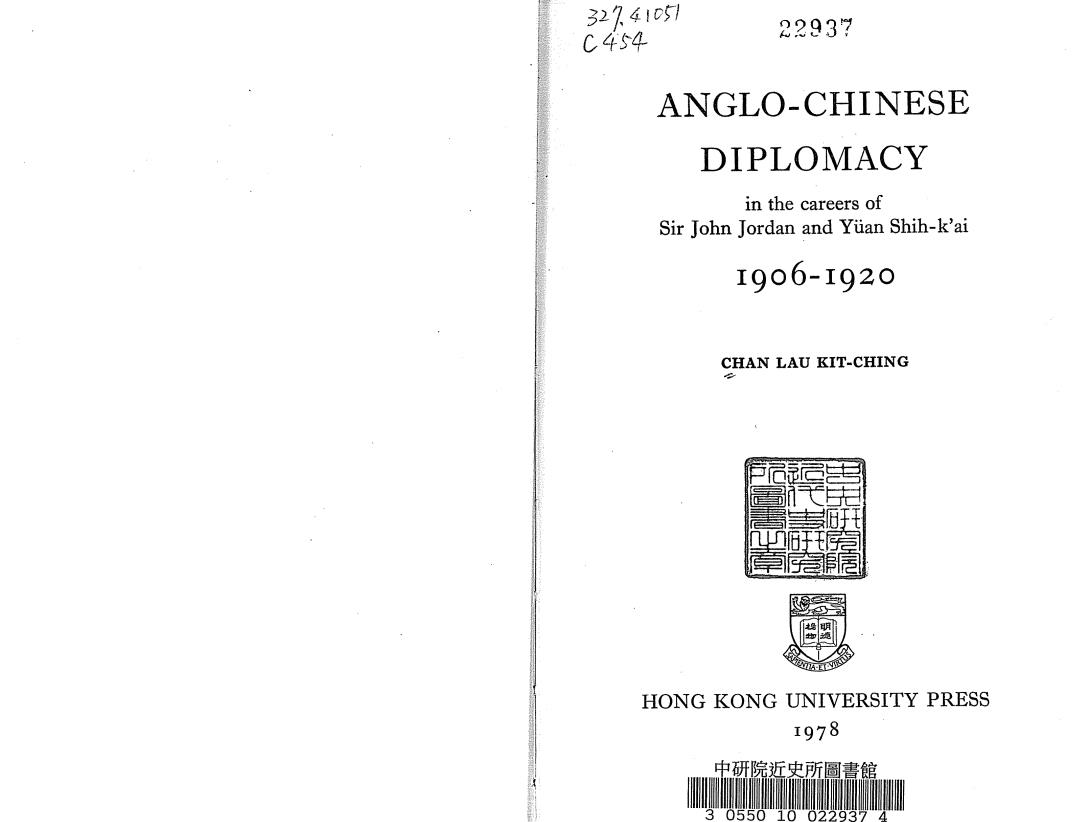
3274151 C4s4 2293? ANGLO-CHINESE DIPLOMACY in the careers of Sir John Jordan and Yuan Shih-k'ai I906-I920 CHAN LAU KIT-CHING HONG KONG UNIVERSITY PRESS I978 中研院近史所圖書館 055010 022937
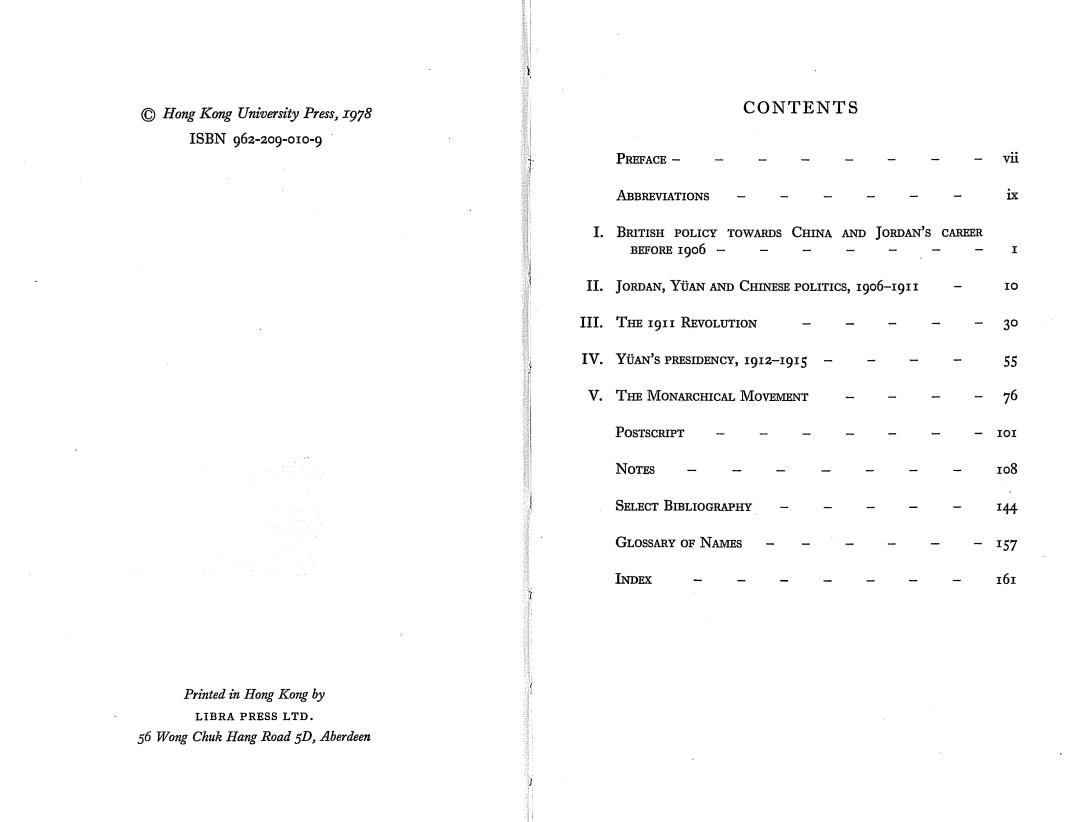
C Hong Kong University Press,1978 CONTENTS ISBN962-209-oI0-9 PREFACE vii ABBREVIATIONS ix I.BRITISH POLICY TOWARDS CHINA AND JORDAN'S CAREER BEFORE I906 I II.JORDAN,YUAN AND CHINESE POLITICS,1906-191I IO III.THE I9II REVOLUTION 30 IV.YUAN's PRESIDENCY,I9I2-1915 55 V.THE MONARCHICAL MOVEMENT 76 POSTSCRIPT IOI NOTES 一 108 SELECT BIBLIOGRAPHY I44 GLOSSARY OF NAMES I57 INDEX 161 Printed in Hong Kong by LIBRA PRESS LTD. 56 Wong Chuk Hang Road 5D,Aberdeen
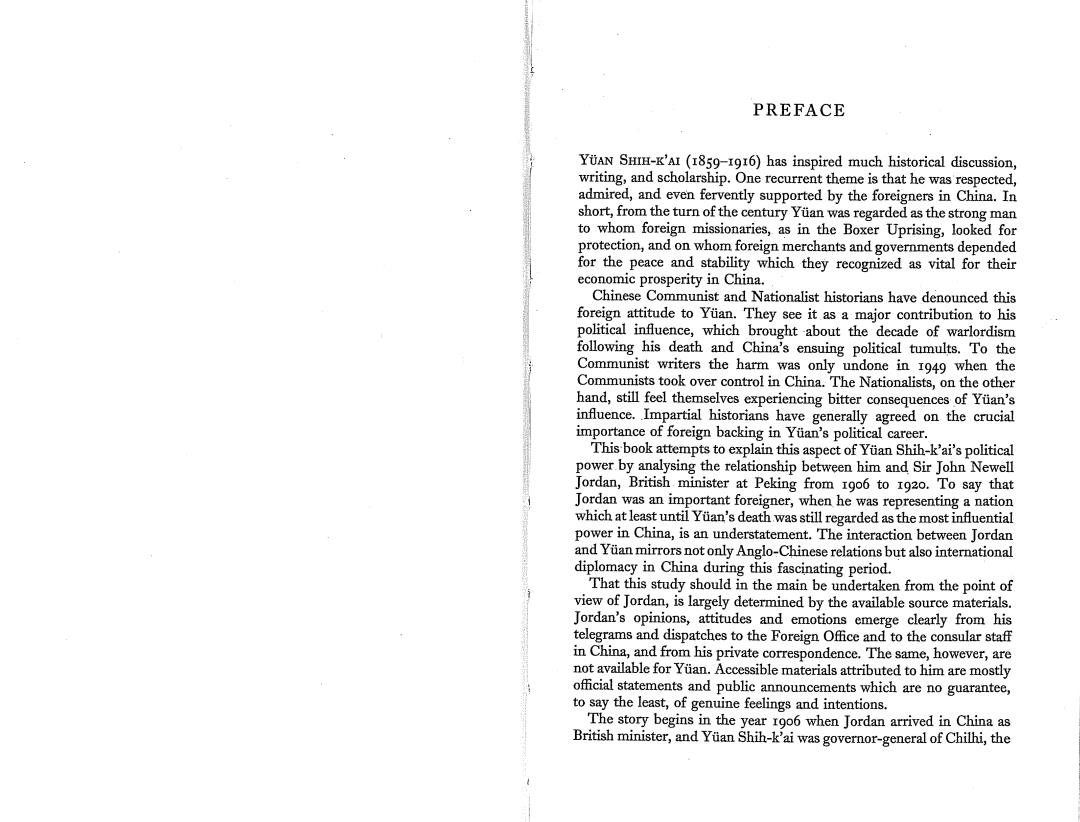
PREFACE YUAN SHIH-K'AI(1859-1916)has inspired much historical discussion, writing,and scholarship.One recurrent theme is that he was respected, admired,and even fervently supported by the foreigners in China.In short,from the turn of the century Yuan was regarded as the strong man to whom foreign missionaries,as in the Boxer Uprising,looked for protection,and on whom foreign merchants and governments depended for the peace and stability which they recognized as vital for their economic prosperity in China. Chinese Communist and Nationalist historians have denounced this foreign attitude to Yuan.They see it as a major contribution to his political influence,which brought about the decade of warlordism following his death and China's ensuing political tumults.To the Communist writers the harm was only undone in 1949 when the Communists took over control in China.The Nationalists,on the other hand,still feel themselves experiencing bitter consequences of Yuian's influence.Impartial historians have generally agreed on the crucial importance of foreign backing in Yuan's political career. This book attempts to explain this aspect of Yuan Shih-k'ai's political power by analysing the relationship between him and Sir John Newell Jordan,British minister at Peking from 1go6 to 1g20.To say that Jordan was an important foreigner,when he was representing a nation which at least until Yuan's death was still regarded as the most influential power in China,is an understatement.The interaction between Jordan and Yuan mirrors not only Anglo-Chinese relations but also international diplomacy in China during this fascinating period. That this study should in the main be undertaken from the point of view of Jordan,is largely determined by the available source materials. Jordan's opinions,attitudes and emotions emerge clearly from his telegrams and dispatches to the Foreign Office and to the consular staff in China,and from his private correspondence.The same,however,are not available for Yuian.Accessible materials attributed to him are mostly official statements and public announcements which are no guarantee, to say the least,of genuine feelings and intentions. The story begins in the year 1go6 when Jordan arrived in China as British minister,and Yuan Shih-k'ai was governor-general of Chilhi,the

viⅷ Anglo-Chinese Diplomacy 19o6-1920 capital province of China.The first chapter deals with the period from 19o6 to the outbreak of the igII Revolution,when Jordan's views on Chinese politics in general and Yuan Shih-k'ai in particular were formed. ABBREVIATIONS The second chapter concentrates on Jordan's strenuous efforts after the III Revolution to have Yuan Shih-k'ai accepted as the de facto ruler within the framework of continued Manchu sovereignty.Jordan failed. CCST :Shen Yun-lung(ed)沈雲前,Chin-tai Chung-kuo The retention of the Manchu dynasty,in whatever reduced or humiliated sih-liao ts'ung-k'an近代中國史料叢列[Collection of form,was anathema to the revolutionaries and their collaborators whose materials relating to modern Chinese history],Taipei, control grew rapidly with the outbreak of the revolution.Chapter three 1966-. is concerned with the years IgI2-19I5,undoubtedly Jordan's most Cheng-chih shih:Li Chien-nung李劍農,Chig-kuo chin pai nien rewarding time as British representative in China.The last chapter,in cheng--chih shih中國近百年政治史Political history contrast,follows Jordan's anxiety as he watched the progress of Yuian's monarchical movement,which ended in tragic failure and with Yuan's of China in the past century],2 vols.,Taiwan,1957. death in June 1916. CHST :Wu Hsiang-hsiang(ed)吳相湘,Chug-kuo hsien--tai In 1g20,however,Jordan did not leave China in despair.He had shih-liao ts'ung-shu中國現代史料叢書[Collection of recovered from the events of ror6 and,despite the divided state of China materials relating to contemporary Chinese history], at the time of his departure,his goodwill towards the Chinese continued. Taipei,,Ig62-· For instance,even in his retirement as a member of the British delegation CHT Wu Hsiang-hsiang (ed.),Chung-kuo hsien-tai shih sent to the Washington Conference,he was devoting himself to what he ug-h'an中國現代史叢列[Collection on Chinese regarded as a good cause for China-as he had done in supporting Yuan Shih-k'ai as the most dependable man to safeguard the interests of both contemporary history],6 vols.,Taipei,196o-64. China and Britain. HHKM Ch'aiTe-keng柴德度etc,(ed),Hsr-hai ke--mig I dedicate this book,unworthy though it is,to Professor W.G. 辛亥革命[The IgII Revolution],8vols,Shanghai, Beasley,School of Oriental and African Studies,University of London, 957. and Dr I.H.Nish,London School of Economics and Political Science, NGB Japanese Foreign Ministry,Nihon gaiko bunsho who have been sources of strength,support,and inspiration in my 外交文普Documents relating to Japan's foreign academic life,and to whom I am deeply grateful.Dr Peter Lowe of the University of Manchester has patiently read through the manuscript relations]. and given much good advice.Thanks are also due to Miss Natalie Treaties J.V.A.MacMurray,Treaties and agreements with Graham for her diligent editing of the manuscript. and concerning China,2 vols.,New York,I921. K.C.L.C. YSH Shen Yiin-lung (ed.),Yiian Shih-k'ai shih-liao hui- 'an壹世凯史料彙刊[Collection of materials relating to Yuan Shih-k'ai],I7 titles,Taipei,1966
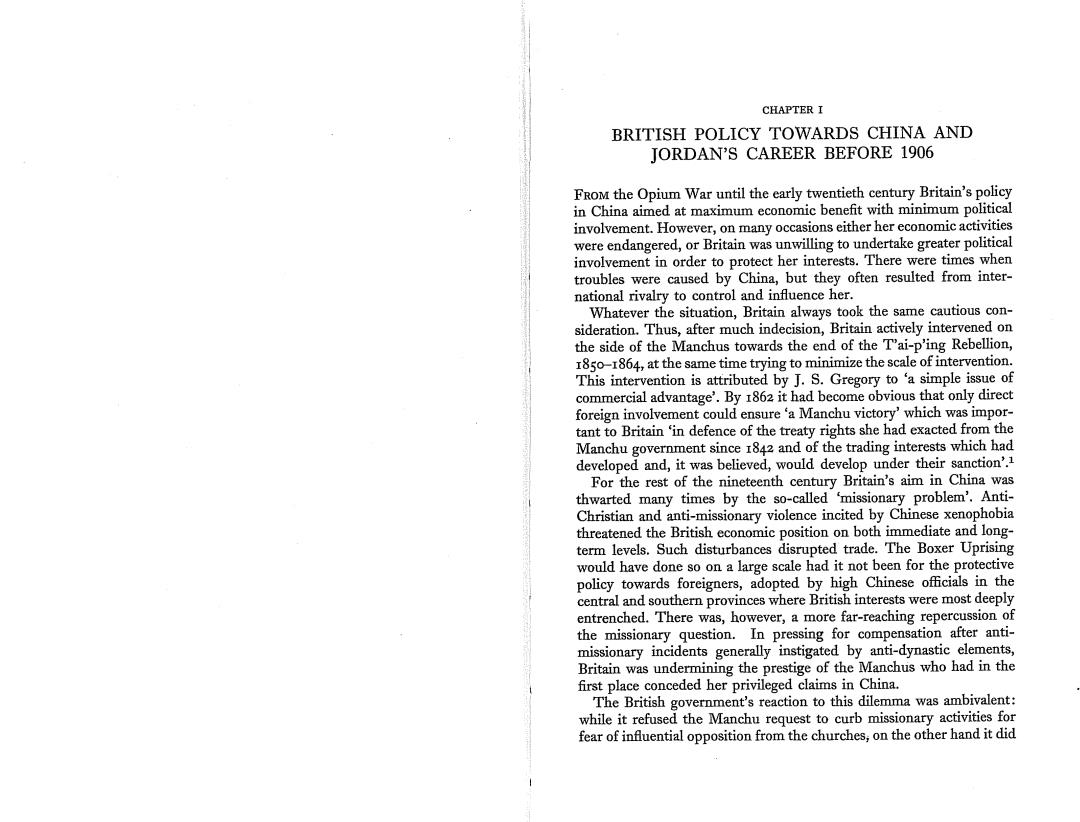
CHAPTER I BRITISH POLICY TOWARDS CHINA AND JORDAN'S CAREER BEFORE 1906 FROM the Opium War until the early twentieth century Britain's policy in China aimed at maximum economic benefit with minimum political involvement.However,on many occasions either her economic activities were endangered,or Britain was unwilling to undertake greater political involvement in order to protect her interests.There were times when troubles were caused by China,but they often resulted from inter- national rivalry to control and influence her. Whatever the situation,Britain always took the same cautious con- sideration.Thus,after much indecision,Britain actively intervened on the side of the Manchus towards the end of the Tai-p'ing Rebellion, 1850-1864,at the same time trying to minimize the scale of intervention. This intervention is attributed by J.S.Gregory to 'a simple issue of commercial advantage'.By 1862 it had become obvious that only direct foreign involvement could ensure 'a Manchu victory'which was impor- tant to Britain in defence of the treaty rights she had exacted from the Manchu government since 1842 and of the trading interests which had developed and,it was believed,would develop under their sanction'.1 For the rest of the nineteenth century Britain's aim in China was thwarted many times by the so-called 'missionary problem'.Anti- Christian and anti-missionary violence incited by Chinese xenophobia threatened the British economic position on both immediate and long- term levels.Such disturbances disrupted trade.The Boxer Uprising would have done so on a large scale had it not been for the protective policy towards foreigners,adopted by high Chinese officials in the central and southern provinces where British interests were most deeply entrenched.There was,however,a more far-reaching repercussion of the missionary question.In pressing for compensation after anti- missionary incidents generally instigated by anti-dynastic elements, Britain was undermining the prestige of the Manchus who had in the first place conceded her privileged claims in China. The British government's reaction to this dilemma was ambivalent: while it refused the Manchu request to curb missionary activities for fear of infuential opposition from the churches;on the other hand it did
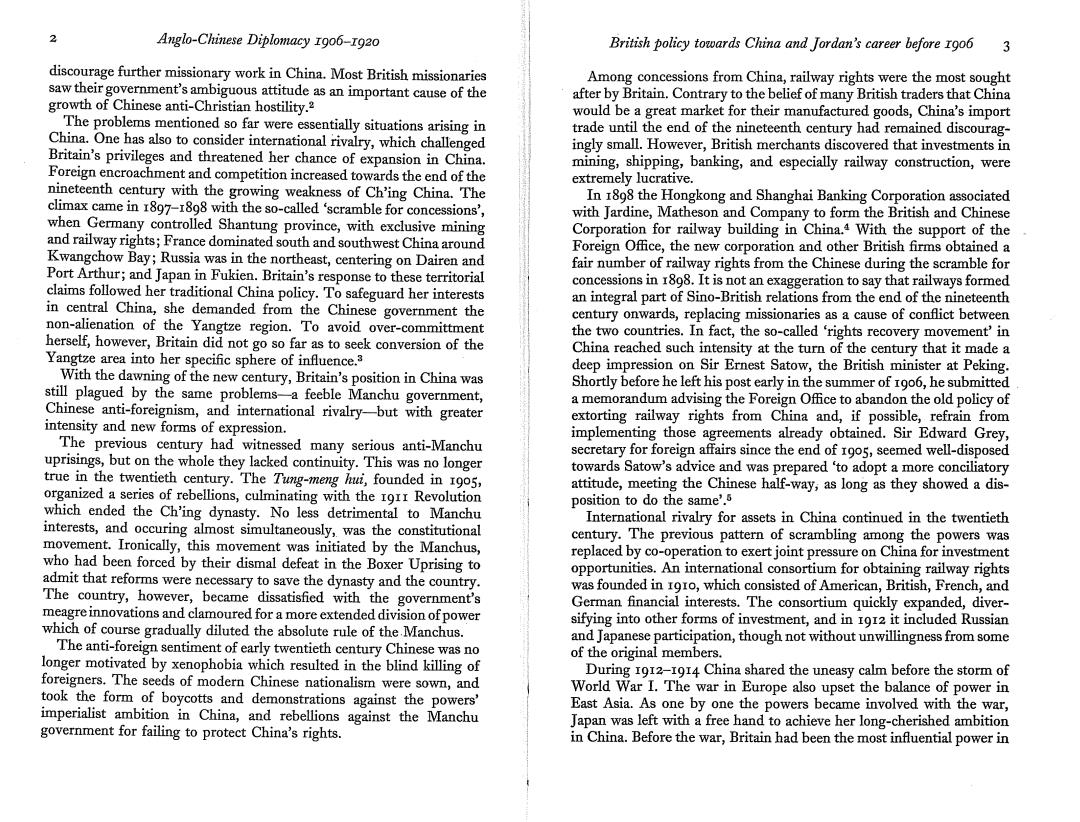
2 Anglo-Chinese Diplomacy 1go6-I920 British policy towards China and fordan's career before 1go6 3 discourage further missionary work in China.Most British missionaries Among concessions from China,railway rights were the most sought saw their government's ambiguous attitude as an important cause of the after by Britain.Contrary to the belief of many British traders that China growth of Chinese anti-Christian hostility.2 would be a great market for their manufactured goods,China's import The problems mentioned so far were essentially situations arising in trade until the end of the nineteenth century had remained discourag- China.One has also to consider international rivalry,which challenged ingly small.However,British merchants discovered that investments in Britain's privileges and threatened her chance of expansion in China. mining,shipping,banking,and especially railway construction,were Foreign encroachment and competition increased towards the end of the extremely lucrative. nineteenth century with the growing weakness of Ch'ing China.The climax came in 1897-1898 with the so-called 'scramble for concessions', In 1898 the Hongkong and Shanghai Banking Corporation associated when Germany controlled Shantung province,with exclusive mining with Jardine,Matheson and Company to form the British and Chinese Corporation for railway building in China.4 With the support of the and railway rights;France dominated south and southwest China around Foreign Office,the new corporation and other British firms obtained a Kwangchow Bay;Russia was in the northeast,centering on Dairen and fair number of railway rights from the Chinese during the scramble for Port Arthur;and Japan in Fukien.Britain's response to these territorial claims followed her traditional China policy.To safeguard her interests concessions in 1898.It is not an exaggeration to say that railways formed an integral part of Sino-British relations from the end of the nineteenth in central China,she demanded from the Chinese government the century onwards,replacing missionaries as a cause of conflict between non-alienation of the Yangtze region.To avoid over-committment the two countries.In fact,the so-called 'rights recovery movement'in herself,however,Britain did not go so far as to seek conversion of the Yangtze area into her specific sphere of influence.3 China reached such intensity at the turn of the century that it made a deep impression on Sir Ernest Satow,the British minister at Peking. With the dawning of the new century,Britain's position in China was still plagued by the same problems-a feeble Manchu government, Shortly before he left his post early in the summer of 1go6,he submitted a memorandum advising the Foreign Office to abandon the old policy of Chinese anti-foreignism,and international rivalry-but with greater extorting railway rights from China and,if possible,refrain from intensity and new forms of expression. The previous century had witnessed many serious anti-Manchu implementing those agreements already obtained.Sir Edward Grey, uprisings,but on the whole they lacked continuity.This was no longer secretary for foreign affairs since the end of rgo5,seemed well-disposed true in the twentieth century.The Tung-meng hui,founded in 19o5, towards Satow's advice and was prepared 'to adopt a more conciliatory attitude,meeting the Chinese half-way,as long as they showed a dis- organized a series of rebellions,culminating with the IoIr Revolution position to do the same'.5 which ended the Ch'ing dynasty.No less detrimental to Manchu International rivalry for assets in China continued in the twentieth interests,and occuring almost simultaneously,was the constitutional movement.Ironically,this movement was initiated by the Manchus, century.The previous pattern of scrambling among the powers was who had been forced by their dismal defeat in the Boxer Uprising to replaced by co-operation to exert joint pressure on China for investment admit that reforms were necessary to save the dynasty and the country. opportunities.An international consortium for obtaining railway rights was founded in Igro,which consisted of American,British,French,and The country,however,became dissatisfied with the government's German financial interests.The consortium quickly expanded,diver- meagre innovations and clamoured for a more extended division of power which of course gradually diluted the absolute rule of the Manchus. sifying into other forms of investment,and in IgI2 it included Russian The anti-foreign sentiment of early twentieth century Chinese was no and Japanese participation,though not without unwillingness from some of the original members. longer motivated by xenophobia which resulted in the blind killing of During I9I2-1914 China shared the uneasy calm before the storm of foreigners.The seeds of modern Chinese nationalism were sown,and World War I.The war in Europe also upset the balance of power in took the form of boycotts and demonstrations against the powers' imperialist ambition in China,and rebellions against the Manchu East Asia.As one by one the powers became involved with the war, government for failing to protect China's rights. Japan was left with a free hand to achieve her long-cherished ambition in China.Before the war,Britain had been the most influential power in
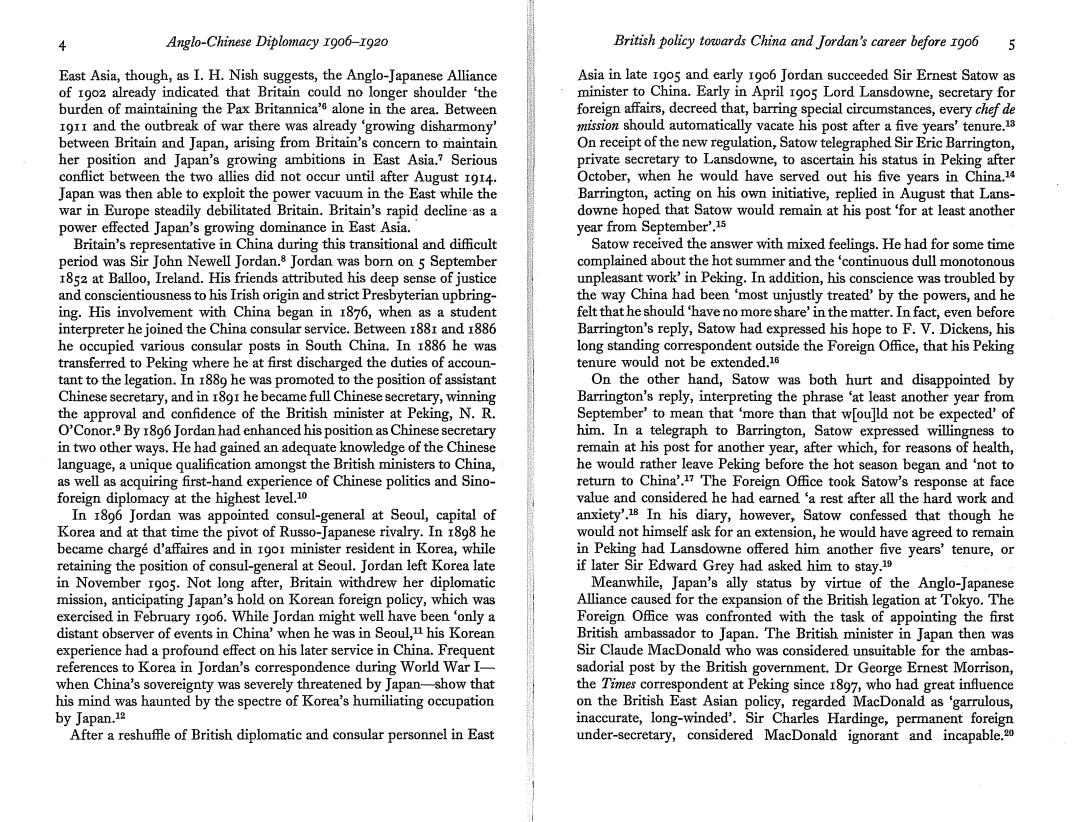
4 Anglo-Chinese Diplomacy 19o6-1920 British policy towards China and fordan's career before 19o6 5 East Asia,though,as I.H.Nish suggests,the Anglo-Japanese Alliance Asia in late Igo5 and early Igo6 Jordan succeeded Sir Ernest Satow as of Igo2 already indicated that Britain could no longer shoulder 'the minister to China.Early in April 1go5 Lord Lansdowne,secretary for burden of maintaining the Pax Britannica'e alone in the area.Between foreign affairs,decreed that,barring special circumstances,every chef de IgII and the outbreak of war there was already 'growing disharmony' mission should automatically vacate his post after a five years'tenure.18 between Britain and Japan,arising from Britain's concern to maintain On receipt of the new regulation,Satow telegraphed Sir Eric Barrington, her position and Japan's growing ambitions in East Asia.?Serious private secretary to Lansdowne,to ascertain his status in Peking after conflict between the two allies did not occur until after August 1914. October,when he would have served out his five years in China.14 Japan was then able to exploit the power vacuum in the East while the Barrington,acting on his own initiative,replied in August that Lans- war in Europe steadily debilitated Britain.Britain's rapid decline as a downe hoped that Satow would remain at his post'for at least another power effected Japan's growing dominance in East Asia. year from September'.15 Britain's representative in China during this transitional and difficult Satow received the answer with mixed feelings.He had for some time period was Sir John Newell Jordan.8 Jordan was born on 5 September complained about the hot summer and the 'continuous dull monotonous 1852 at Balloo,Ireland.His friends attributed his deep sense of justice unpleasant work'in Peking.In addition,his conscience was troubled by and conscientiousness to his Irish origin and strict Presbyterian upbring- the way China had been 'most unjustly treated'by the powers,and he ing.His involvement with China began in 1876,when as a student felt that he should 'have no more share'in the matter.In fact,even before interpreter he joined the China consular service.Between 188I and 1886 Barrington's reply,Satow had expressed his hope to F.V.Dickens,his he occupied various consular posts in South China.In 1886 he was long standing correspondent outside the Foreign Office,that his Peking transferred to Peking where he at first discharged the duties of accoun- tenure would not be extended.16 tant to the legation.In 1889 he was promoted to the position of assistant On the other hand,Satow was both hurt and disappointed by Chinese secretary,and in I8oI he became full Chinese secretary,winning Barrington's reply,interpreting the phrase'at least another year from the approval and confidence of the British minister at Peking,N.R. September'to mean that 'more than that wfoulld not be expected'of O'Conor.By 1896 Jordan had enhanced his position as Chinese secretary him.In a telegraph to Barrington,Satow expressed willingness to in two other ways.He had gained an adequate knowledge of the Chinese remain at his post for another year,after which,for reasons of health, language,a unique qualification amongst the British ministers to China, he would rather leave Peking before the hot season began and 'not to as well as acquiring first-hand experience of Chinese politics and Sino- return to China'.17 The Foreign Office took Satow's response at face foreign diplomacy at the highest level.10 value and considered he had earned 'a rest after all the hard work and In 1896 Jordan was appointed consul-general at Seoul,capital of anxiety'.18 In his diary,however,Satow confessed that though he Korea and at that time the pivot of Russo-Japanese rivalry.In 1898 he would not himself ask for an extension,he would have agreed to remain became charge d'affaires and in Igor minister resident in Korea,while in Peking had Lansdowne offered him another five years'tenure,or retaining the position of consul-general at Seoul.Jordan left Korea late if later Sir Edward Grey had asked him to stay.19 in November rgo5.Not long after,Britain withdrew her diplomatic Meanwhile,Japan's ally status by virtue of the Anglo-Japanese mission,anticipating Japan's hold on Korean foreign policy,which was Alliance caused for the expansion of the British legation at Tokyo.The exercised in February 19o6.While Jordan might well have been'only a Foreign Office was confronted with the task of appointing the first distant observer of events in China'when he was in Seoul,u his Korean British ambassador to Japan.The British minister in Japan then was experience had a profound effect on his later service in China.Frequent Sir Claude MacDonald who was considered unsuitable for the ambas- references to Korea in Jordan's correspondence during World War I- sadorial post by the British government.Dr George Ernest Morrison, when China's sovereignty was severely threatened by Japan-show that the Times correspondent at Peking since 1897,who had great influence his mind was haunted by the spectre of Korea's humiliating occupation on the British East Asian policy,regarded MacDonald as'garrulous, by Japan.12 inaccurate,long-winded'.Sir Charles Hardinge,permanent foreign After a reshuffle of British diplomatic and consular personnel in East under-secretary,considered MacDonald ignorant and incapable.20
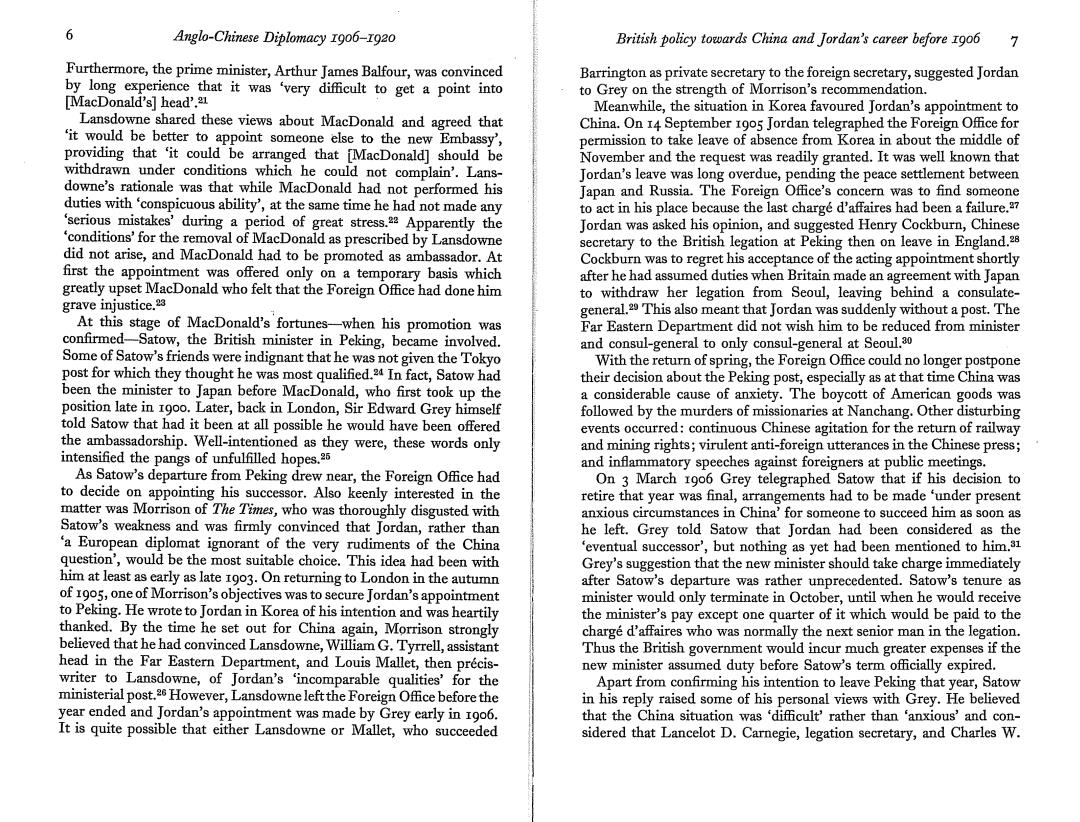
6 Anglo-Chinese Diplomacy I9o6-1920 British policy towards China and Jordan's career before 19o6 Furthermore,the prime minister,Arthur James Balfour,was convinced Barrington as private secretary to the foreign secretary,suggested Jordan by long experience that it was 'very difficult to get a point into to Grey on the strength of Morrison's recommendation. [MacDonald's]head'.21 Meanwhile,the situation in Korea favoured Jordan's appointment to Lansdowne shared these views about MacDonald and agreed that China.On 14 September 1go5 Jordan telegraphed the Foreign Office for 'it would be better to appoint someone else to the new Embassy', permission to take leave of absence from Korea in about the middle of providing that 'it could be arranged that [MacDonald]should be November and the request was readily granted.It was well known that withdrawn under conditions which he could not complain'.Lans- Jordan's leave was long overdue,pending the peace settlement between downe's rationale was that while MacDonald had not performed his Japan and Russia.The Foreign Office's concern was to find someone duties with 'conspicuous ability',at the same time he had not made any to act in his place because the last charge d'affaires had been a failure.27 'serious mistakes'during a period of great stress.22 Apparently the Jordan was asked his opinion,and suggested Henry Cockburn,Chinese 'conditions'for the removal of MacDonald as prescribed by Lansdowne secretary to the British legation at Peking then on leave in England.28 did not arise,and MacDonald had to be promoted as ambassador.At Cockburn was to regret his acceptance of the acting appointment shortly first the appointment was offered only on a temporary basis which after he had assumed duties when Britain made an agreement with Japan greatly upset MacDonald who felt that the Foreign Office had done him to withdraw her legation from Seoul,leaving behind a consulate- grave injustice.23 general.29 This also meant that Jordan was suddenly without a post.The At this stage of MacDonald's fortunes-when his promotion was Far Eastern Department did not wish him to be reduced from minister confirmed-Satow,the British minister in Peking,became involved. and consul-general to only consul-general at Seoul.30 Some of Satow's friends were indignant that he was not given the Tokyo With the return of spring,the Foreign Office could no longer postpone post for which they thought he was most qualified.34 In fact,Satow had their decision about the Peking post,especially as at that time China was been the minister to Japan before MacDonald,who first took up the a considerable cause of anxiety.The boycott of American goods was position late in 1goo.Later,back in London,Sir Edward Grey himself followed by the murders of missionaries at Nanchang.Other disturbing told Satow that had it been at all possible he would have been offered events occurred:continuous Chinese agitation for the return of railway the ambassadorship.Well-intentioned as they were,these words only and mining rights;virulent anti-foreign utterances in the Chinese press; intensified the pangs of unfulfilled hopes.35 and inflammatory speeches against foreigners at public meetings. As Satow's departure from Peking drew near,the Foreign Office had On 3 March 1go6 Grey telegraphed Satow that if his decision to to decide on appointing his successor.Also keenly interested in the retire that year was final,arrangements had to be made 'under present matter was Morrison of The Times,who was thoroughly disgusted with anxious circumstances in China'for someone to succeed him as soon as Satow's weakness and was firmly convinced that Jordan,rather than he left.Grey told Satow that Jordan had been considered as the 'a European diplomat ignorant of the very rudiments of the China 'eventual successor',but nothing as yet had been mentioned to him.31 question',would be the most suitable choice.This idea had been with Grey's suggestion that the new minister should take charge immediately him at least as early as late 1go3.On returning to London in the autumn after Satow's departure was rather unprecedented.Satow's tenure as of Igo5,one of Morrison's objectives was to secure Jordan's appointment minister would only terminate in October,until when he would receive to Peking.He wrote to Jordan in Korea of his intention and was heartily the minister's pay except one quarter of it which would be paid to the thanked.By the time he set out for China again,Morrison strongly charge d'affaires who was normally the next senior man in the legation. believed that he had convinced Lansdowne,William G.Tyrrell,assistant Thus the British government would incur much greater expenses if the head in the Far Eastern Department,and Louis Mallet,then precis- new minister assumed duty before Satow's term officially expired. writer to Lansdowne,of Jordan's 'incomparable qualities'for the Apart from confirming his intention to leave Peking that year,Satow ministerial post.26 However,Lansdowne left the Foreign Office before the in his reply raised some of his personal views with Grey.He believed year ended and Jordan's appointment was made by Grey early in 1go6. that the China situation was 'difficult'rather than 'anxious'and con- It is quite possible that either Lansdowne or Mallet,who succeeded sidered that Lancelot D.Carnegie,legation secretary,and Charles W
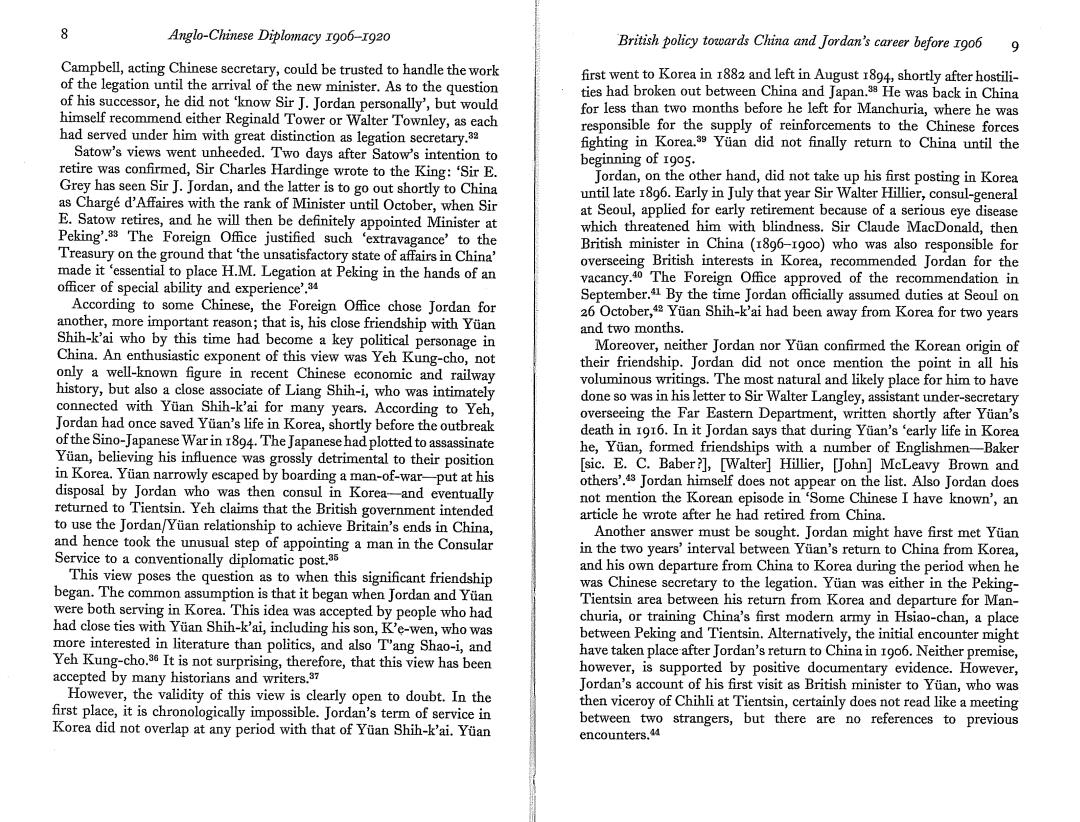
8 Anglo-Chinese Diplomacy 1go6-1920 British policy towards China and Jordan's career before 19o6 9 Campbell,acting Chinese secretary,could be trusted to handle the work of the legation until the arrival of the new minister.As to the question first went to Korea in 1882 and left in August 1894,shortly after hostili- of his successor,he did not 'know Sir J.Jordan personally',but would ties had broken out between China and Japan.38 He was back in China himself recommend either Reginald Tower or Walter Townley,as each for less than two months before he left for Manchuria,where he was had served under him with great distinction as legation secretary.32 responsible for the supply of reinforcements to the Chinese forces Satow's views went unheeded.Two days after Satow's intention to fighting in Korea.39 Yian did not finally return to China until the retire was confirmed,Sir Charles Hardinge wrote to the King:Sir E. beginning of 19o5. Grey has seen Sir J.Jordan,and the latter is to go out shortly to China Jordan,on the other hand,did not take up his first posting in Korea as Charge d'Affaires with the rank of Minister until October,when Sir until late 1896.Early in July that year Sir Walter Hillier,consul-general E.Satow retires,and he will then be definitely appointed Minister at at Seoul,applied for early retirement because of a serious eye disease Peking'.38 The Foreign Office justified such 'extravagance'to the which threatened him with blindness.Sir Claude MacDonald,then British minister in China (1896-Igoo)who was also responsible for Treasury on the ground that 'the unsatisfactory state of affairs in China' made it'essential to place H.M.Legation at Peking in the hands of an overseeing British interests in Korea,recommended Jordan for the officer of special ability and experience'.4 vacancy.40 The Foreign Office approved of the recommendation in September.41 By the time Jordan officially assumed duties at Seoul on According to some Chinese,the Foreign Office chose Jordan for another,more important reason;that is,his close friendship with Yuan 26 October,42 Yuian Shih-k'ai had been away from Korea for two years and two months. Shih-k'ai who by this time had become a key political personage in China.An enthusiastic exponent of this view was Yeh Kung-cho,not Moreover,neither Jordan nor Yuan confirmed the Korean origin of their friendship.Jordan did not once mention the point in all his only a well-known figure in recent Chinese economic and railway history,but also a close associate of Liang Shih-i,who was intimately voluminous writings.The most natural and likely place for him to have connected with Yuan Shih-k'ai for many years.According to Yeh, done so was in his letter to Sir Walter Langley,assistant under-secretary Jordan had once saved Yuan's life in Korea,shortly before the outbreak overseeing the Far Eastern Department,written shortly after Yuian's death in 1916.In it Jordan says that during Yuan's 'early life in Korea of the Sino-Japanese War in 1894.The Japanese had plotted to assassinate he,Yuan,formed friendships with a number of Englishmen-Baker Yuan,believing his influence was grossly detrimental to their position in Korea.Yuian narrowly escaped by boarding a man-of-war-put at his [sic.E.C.Baber?],[Walter]Hillier,[John]McLeavy Brown and disposal by Jordan who was then consul in Korea-and eventually others'.43 Jordan himself does not appear on the list.Also Jordan does returned to Tientsin.Yeh claims that the British government intended not mention the Korean episode in 'Some Chinese I have known',an article he wrote after he had retired from China. to use the Jordan/Yuan relationship to achieve Britain's ends in China, Another answer must be sought.Jordan might have first met Yuan and hence took the unusual step of appointing a man in the Consular Service to a conventionally diplomatic post.35 in the two years'interval between Yuan's return to China from Korea, This view poses the question as to when this significant friendship and his own departure from China to Korea during the period when he began.The common assumption is that it began when Jordan and Yuan was Chinese secretary to the legation.Yuan was either in the Peking- were both serving in Korea.This idea was accepted by people who had Tientsin area between his return from Korea and departure for Man- had close ties with Yuian Shih-k'ai,including his son,K'e-wen,who was churia,or training China's first modern army in Hsiao-chan,a place more interested in literature than politics,and also T'ang Shao-i,and between Peking and Tientsin.Alternatively,the initial encounter might Yeh Kung-cho.36 It is not surprising,therefore,that this view has been have taken place after Jordan's return to China in 19o6.Neither premise, accepted by many historians and writers.37 however,is supported by positive documentary evidence.However, Jordan's account of his first visit as British minister to Yuan,who was However,the validity of this view is clearly open to doubt.In the first place,it is chronologically impossible.Jordan's term of service in then viceroy of Chihli at Tientsin,certainly does not read like a meeting Korea did not overlap at any period with that of Yuan Shih-k'ai.Yuan between two strangers,but there are no references to previous encounters.44
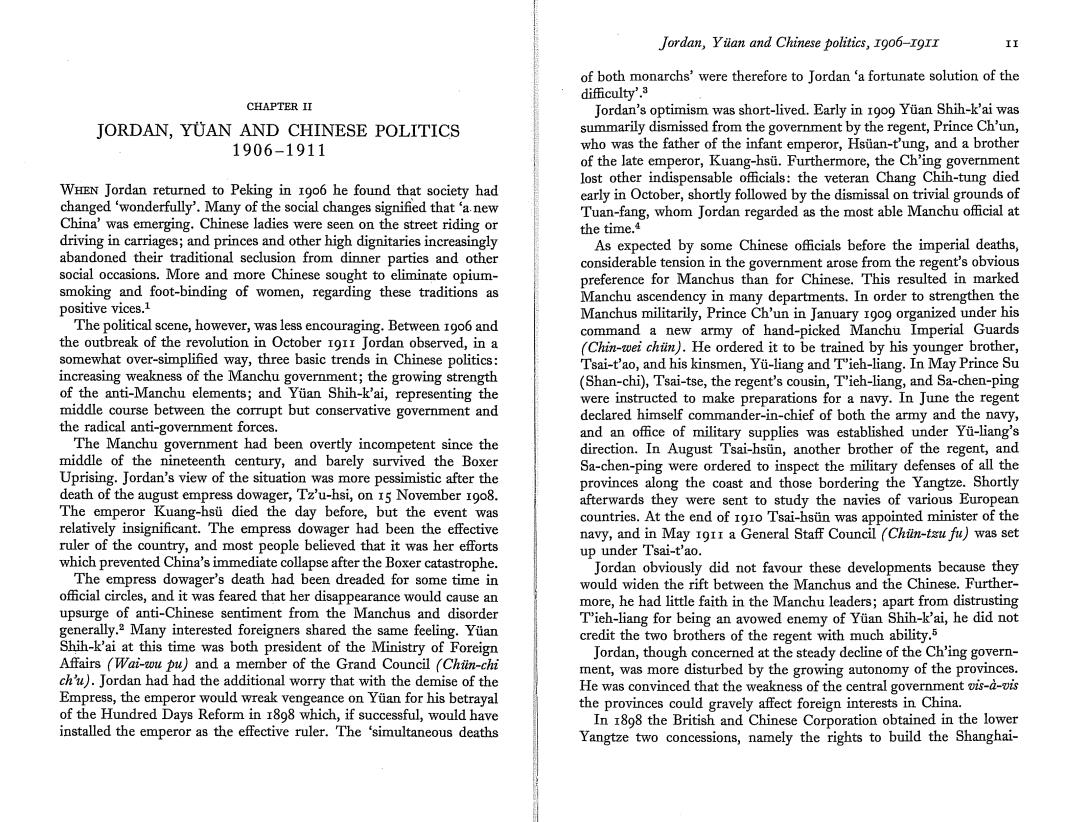
Jordan,Yiian and Chinese politics,1906-I9rI II of both monarchs'were therefore to Jordan 'a fortunate solution of the difficulty'.3 CHAPTER II Jordan's optimism was short-lived.Early in Igog Yuan Shih-k'ai was JORDAN,YUAN AND CHINESE POLITICS summarily dismissed from the government by the regent,Prince Ch'un, 1906-1911 who was the father of the infant emperor,Hstan-t'ung,and a brother of the late emperor,Kuang-hsti.Furthermore,the Ch'ing government lost other indispensable officials:the veteran Chang Chih-tung died WHEN Jordan returned to Peking in 1go6 he found that society had early in October,shortly followed by the dismissal on trivial grounds of changed wonderfully'.Many of the social changes signified that'a.new Tuan-fang,whom Jordan regarded as the most able Manchu official at China'was emerging.Chinese ladies were seen on the street riding or the time.4 driving in carriages;and princes and other high dignitaries increasingly As expected by some Chinese officials before the imperial deaths, abandoned their traditional seclusion from dinner parties and other considerable tension in the government arose from the regent's obvious social occasions.More and more Chinese sought to eliminate opium- preference for Manchus than for Chinese.This resulted in marked smoking and foot-binding of women,regarding these traditions as Manchu ascendency in many departments.In order to strengthen the positive vices.1 Manchus militarily,Prince Ch'un in January Igog organized under his The political scene,however,was less encouraging.Between 19o6 and command a new army of hand-picked Manchu Imperial Guards the outbreak of the revolution in October IgIr Jordan observed,in a (Chin-wei chtin).He ordered it to be trained by his younger brother, somewhat over-simplified way,three basic trends in Chinese politics: Tsai-t'ao,and his kinsmen,Yu-liang and T"ieh-liang.In May Prince Su increasing weakness of the Manchu government;the growing strength (Shan-chi),Tsai-tse,the regent's cousin,Tieh-liang,and Sa-chen-ping of the anti-Manchu elements;and Yuan Shih-k'ai,representing the were instructed to make preparations for a navy.In June the regent middle course between the corrupt but conservative government and declared himself commander-in-chief of both the army and the navy, the radical anti-government forces. and an office of military supplies was established under Yu-liang's The Manchu government had been overtly incompetent since the direction.In August Tsai-hstin,another brother of the regent,and middle of the nineteenth century,and barely survived the Boxer Sa-chen-ping were ordered to inspect the military defenses of all the Uprising.Jordan's view of the situation was more pessimistic after the provinces along the coast and those bordering the Yangtze.Shortly death of the august empress dowager,Tz'u-hsi,on I5 November 19o8. afterwards they were sent to study the navies of various European The emperor Kuang-hsu died the day before,but the event was countries.At the end of Igro Tsai-hsun was appointed minister of the relatively insignificant.The empress dowager had been the effective navy,and in May IgII a General Staff Council (Chiin-tau fu)was set ruler of the country,and most people believed that it was her efforts up under Tsai-t'ao. which prevented China's immediate collapse after the Boxer catastrophe. Jordan obviously did not favour these developments because they The empress dowager's death had been dreaded for some time in would widen the rift between the Manchus and the Chinese.Further- official circles,and it was feared that her disappearance would cause an more,he had little faith in the Manchu leaders;apart from distrusting upsurge of anti-Chinese sentiment from the Manchus and disorder Tieh-liang for being an avowed enemy of Yuan Shih-k'ai,he did not generally.2 Many interested foreigners shared the same feeling.Yuan credit the two brothers of the regent with much ability.5 Shih-k'ai at this time was both president of the Ministry of Foreign Jordan,though concerned at the steady decline of the Ch'ing govern- Affairs (Wai-wu pu)and a member of the Grand Council (Chiin-chi ch').Jordan hadhad the additional worry that with the demise of the ment,was more disturbed by the growing autonomy of the provinces. He was convinced that the weakness of the central government vis-d-vis Empress,the emperor would wreak vengeance on Yuian for his betrayal the provinces could gravely affect foreign interests in China. of the Hundred Days Reform in 1898 which,if successful,would have In 1898 the British and Chinese Corporation obtained in the lower installed the emperor as the effective ruler.The 'simultaneous deaths Yangtze two concessions,namely the rights to build the Shanghai-